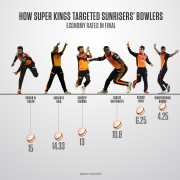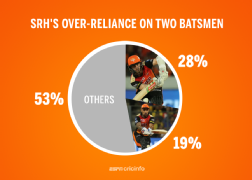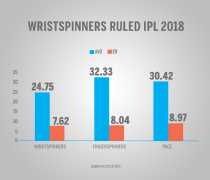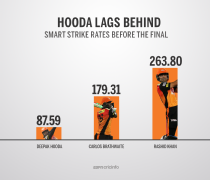|
What happened to Kaul and Sandeep's seasons? After the first 12 games of Sunrisers Hyderabad's league campaign, Siddharth Kaul and Sandeep Sharma were being talked about as critical to Sunrisers' outstanding bowling unit. With Bhuvneshwar Kumar, they gave Sunrisers three reliable Indian seamers, something no other side had. Kaul had gone at a smart economy rate of 6.45, gained a reputation as one of the most effective death bowlers and got a call-up to India's ODI and T20I squads for the tour of England. Sandeep had gone at a smart economy rate of just 4.12, saving his side 26.22 runs over the six matches he played. Since then, Kaul's smart economy rate is 10.55, while Sandeep's is 11.31. In the final, Super Kings targeted the pair, taking them for 95 runs off seven overs.  So what happened to Kaul and Sandeep's seasons? While they played a lot of home games early on, they then had to play three consecutive games on batting friendly pitches in Delhi, Pune and Bengaluru. They took some tap in those games, which may have dented their confidence. It's also possible teams realized the pair were benefiting from the pressure created by Bhuvneshwar and Rashid Khan and needed to be attacked. Their declining form meant Sunrisers went from a bowling unit of five reliable options to one trying to fill in overs by a sixth bowler. Did Williamson give it away between overs 12 and 14? After 11 overs, Super Kings were in control, needing 84 to win off nine overs with nine wickets in hand. Sunrisers had to go for wickets or the game might've ended inside 18 or 19 overs. But Williamson took his most potent threat, Rashid Khan, out of the attack and bowled Carlos Brathwaite, Sandeep and then Brathwaite again. Those three overs went for 50 runs, and by the time his best bowlers, Rashid and Bhuvneshwar, came back in to the attack, the game was already gone. Williamson had his reasons. He didn't have a lot of death options, and possibly wanted Rashid bowling to some of the middle order players rather than Shane Watson and Suresh Raina, who were happy to defend him. But your decision making doesn't look great when the opposition gets it down to 34 to win off 36 balls and you still have two overs from Rashid left.  Did Sunrisers start too slow? Sunrisers Hyderabad scored just 42 runs off the Powerplay, 14 runs less than the average first-innings Powerplay score at the small Wankhede ground. It meant they were always looking at a 160-180 score rather than a 200-plus one, which may have been necessary given the conditions and the strength of Chennai Super Kings' batting line-up. However, Sunrisers have felt compelled to start cautiously because of their reliance on Shikhar Dhawan and Kane Williamson, who had together scored 47% of their runs before the final. In the final, they could not afford to lose those two at the top, as there was no one else in the side who had even scored a fifty in the season.  Karn Sharma justifies his place For the second IPL final in a row, Karn Sharma was selected ahead of Harbhajan Singh. Last season, the two were in the Mumbai Indians squad, and Karn bowled his four overs for 18 in the final. The principal reason for selecting Karn this time was that Super Kings wanted a legspinner in their side. Wristspinners have been by far the most successful bowlers this season. After the game, Harbhajan even said fingerspinners were playing an increasingly limited part in T20 cricket. While Karn's figures in the final, 3-0-25-1, look mediocre, the one wicket he got was of Williamson, Sunrisers' best batsman.  Why Hooda ahead Brathwaite and Rashid?
Why Hooda ahead Brathwaite and Rashid?
In the second playoff, Rashid showed what he could do as a batsman. His 34 not out off 10 balls was key to Sunrisers winning against Kolkata Knight Riders. In the eliminator, Carlos Brathwaite had struck the ball cleanly in a 43 not out off 29 balls. Yet, when Sunrisers lost their fourth wicket in the 16th over, they sent in Deepak Hooda. The logic was, perhaps, that Hooda was the specialist batsman and does have a reputation as a big-hitter himself. But this season, in seven games, his smart strike rate was 87.59. Brathwaite's was 179.31 and Rashid's 263.80. Hooda ended up getting three off three, which delayed Sunrisers final surge. Rashid did not bat at all.
|
